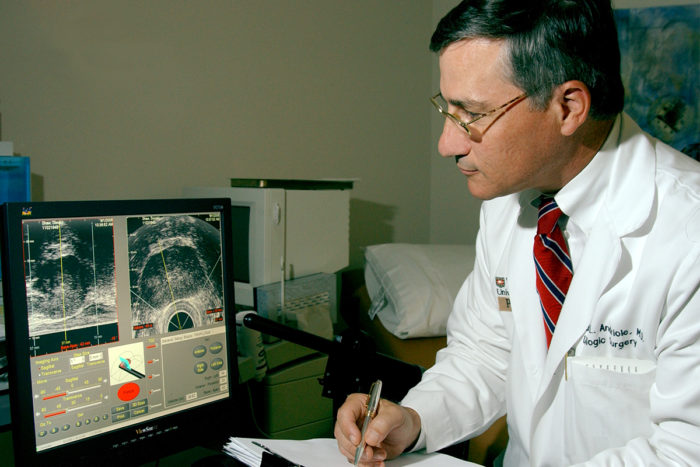Active surveillance is viable option for most prostate tumors
New research at Washington University is re-evaluating the diagnosis and treatment of prostate cancer

Chief of urology Gerald Andriole Jr., MD, leads a new study looking at the outcomes in men who undergo annual prostate screening.
More than half of all prostate cancers detected with PSA screening are early-stage, slow-growing tumors that are unlikely to cause death.
But an elevated PSA test, which measures the level of PSA, prostate specific antigen, a protein produced by the prostate, often leads men to opt for a biopsy. This carries risks, such as infection. If the biopsy finds cancer, even if it seems slow growing, many men are treated aggressively with surgery or radiation therapy, which can lead to impotence, incontinence and other complications.
“In some cases, treatment for prostate cancer does more harm than good,” says Gerald Andriole Jr., MD, at the National Institutes of Health (NIH) State-of-the-Science Conference, sponsored by the National Cancer Institute and Centers for Disease Control and Prevention. “For many men, active surveillance can be a viable alternative to aggressive treatment.”
New surveillance guidelines
The conference, held in December, was part of the NIH Consensus Development Program. An independent panel will use scientific data presented at the meeting to develop a statement on active surveillance for prostate cancer. The incidence of prostate cancer is known to increase as men age, Andriole says. Among men who die in their 70s, autopsies find prostate cancer in nearly 70 percent of Caucasian men and almost 80 percent of African-American men. These tumors often grow so slowly that men don’t experience symptoms that would suggest a problem.
Andriole, who also serves as chief of urologic surgery at Barnes-Jewish Hospital, reviewed data from multiple studies showing that screening leads to overdiagnosis of prostate cancer among middle-aged and elderly men.
“The road to diagnosis is costly,” Andriole explains. “While the PSA test is not a major expense, it too often leads to unnecessary and costly biopsies and treatments that cause anxiety and can have a lasting effect on a man’s quality of life.”






